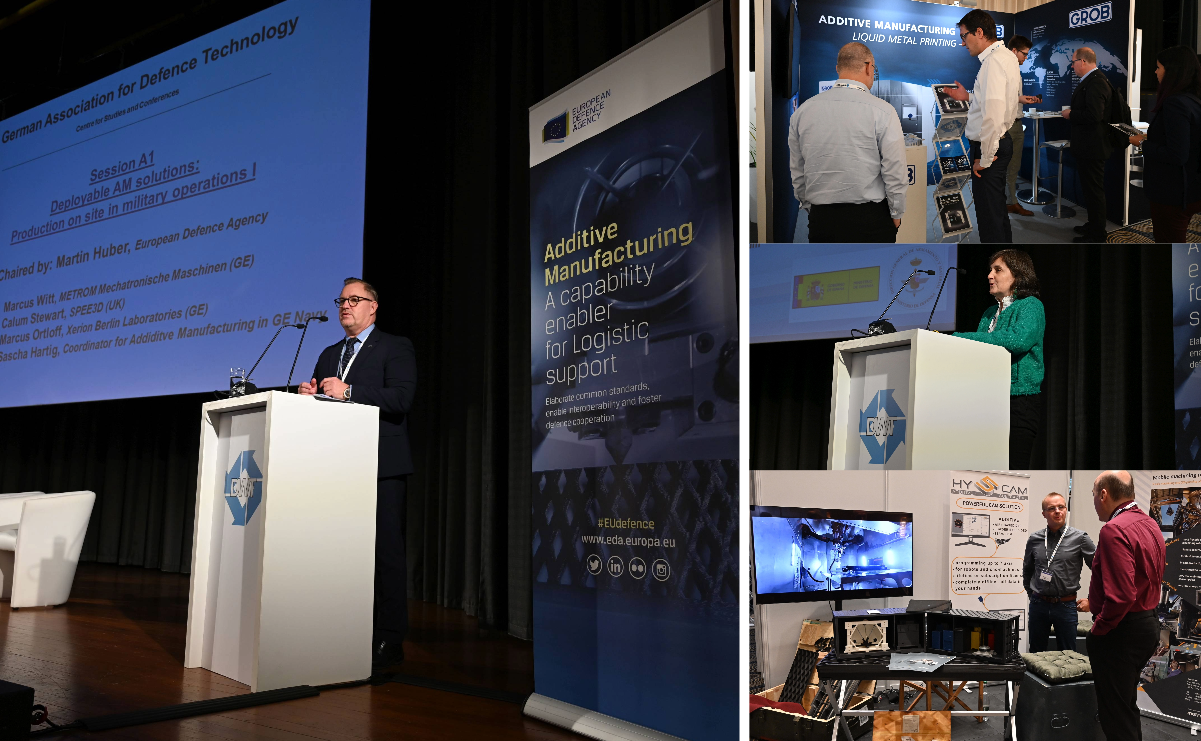Additive Manufacturing (AM) technologies are gaining further prominence in the European defence landscape, with the European Defence Agency (EDA) placing a strong emphasis on their development and integration into the armed forces of its Member States. Supported by EDA, the second edition of the European Military Additive Manufacturing Symposium, heard how growing recognition of the importance of AM technologies needs to be matched by greater collaborative efforts to harness its full potential, especially regarding legal aspects and standardisation.
Organised by the German Association for Defence Technology (DWT), the two-day symposium gathered over 250 experts from the armed forces, industry, SMEs and academia in an expanded format. The wide-ranging event covered on site in military operations, quality assurance, use cases, training, and AMs integration into the military logistics system. The event also gave focus to overcoming some of the persistent barriers to AM’s wide adaption within European armed forces.
In his opening address to the event, EDA Deputy Chief Executive, Andre Denk said: “Additive Manufacturing is a key enabling technology that has significant potential to improve Europe’s industrial competitiveness due to its ability for rapid, decentralised and flexible manufacturing. As European actors, we must ensure timely technological research as well as the development of high-end military capabilities in the Additive Manufacturing domain.”
“At EDA we have transformed our work on Additive Manufacturing from research and technology to capability development. In support of our Member States, we have launched a set of initiatives and activities that will take our work on Additive Manufacturing even further”, he added.
The event also heard how the war in Ukraine has highlighted the importance of agile logistics and the rapid repair of equipment, where Ukraine's Armed Forces use 3D printers to manufacture critical repair parts close to the point of need. This adaptability and integration of equipment is a model that EU member states could explore to enhance the resilience of their supply chains. One of the key messages from the event called for Original Equipment Manufacturer (OEM) to consider AM technology in the designing phase of military assets, to take full advantage of AM potential in future.
AM as a Key EU Capability
EDA has long recognised the importance of AM technologies in enhancing the sustainability and agility of defence logistics. Sustainable and agile logistics are essential for the projection, sustainment, and effectiveness of forces, requiring the development of future-generation logistic systems and the implementation of new technical solutions. AM capabilities are expected to reduce the EU's military logistic footprint, ultimately supporting combat maintenance.
To this end EDA representatives led several expert focused sessions on integration of AM into the logistic system of armed forces, evolving opportunities in R&T development and quailty assurance and qualification.

Background: EDA's work on AM: From research to capability
EDA has been actively working on AM technologies for several years. Initiating with a feasibility study in 2018, EDA explored the potential of AM to enhance logistic capabilities. Over the years, EDA has made significant strides in transferring research and technology work on AM to capability development.
One of the initiatives that EDA is undertaking is the Additive Manufacturing for Logistic Support (AMLS) project. AMLS focuses on determining common standards for the use of AM solutions within armed forces and facilitating mutual logistic support.
Additionally, EDA manages the Incubation Forum for Circular Economy in European Defence (IF CEED), which seeks to bring circular economy principles into European defence. The “Circular Additive Manufacturing” Project Circle has incubated three project ideas to further reduce the environmental impact of armed forces, by enhancing circularity in the use of AM.
EDA conducts various studies on legal aspects, IT-based frameworks, and common training and education related to AM. These studies aim to enhance the harmonization and effectiveness of AM deployment in military contexts. EDA also organizes events and workshops related to AM, such as the Additive Manufacturing Village – a five-day capability workshop - which brought together AM experts from military, industry, and academia.